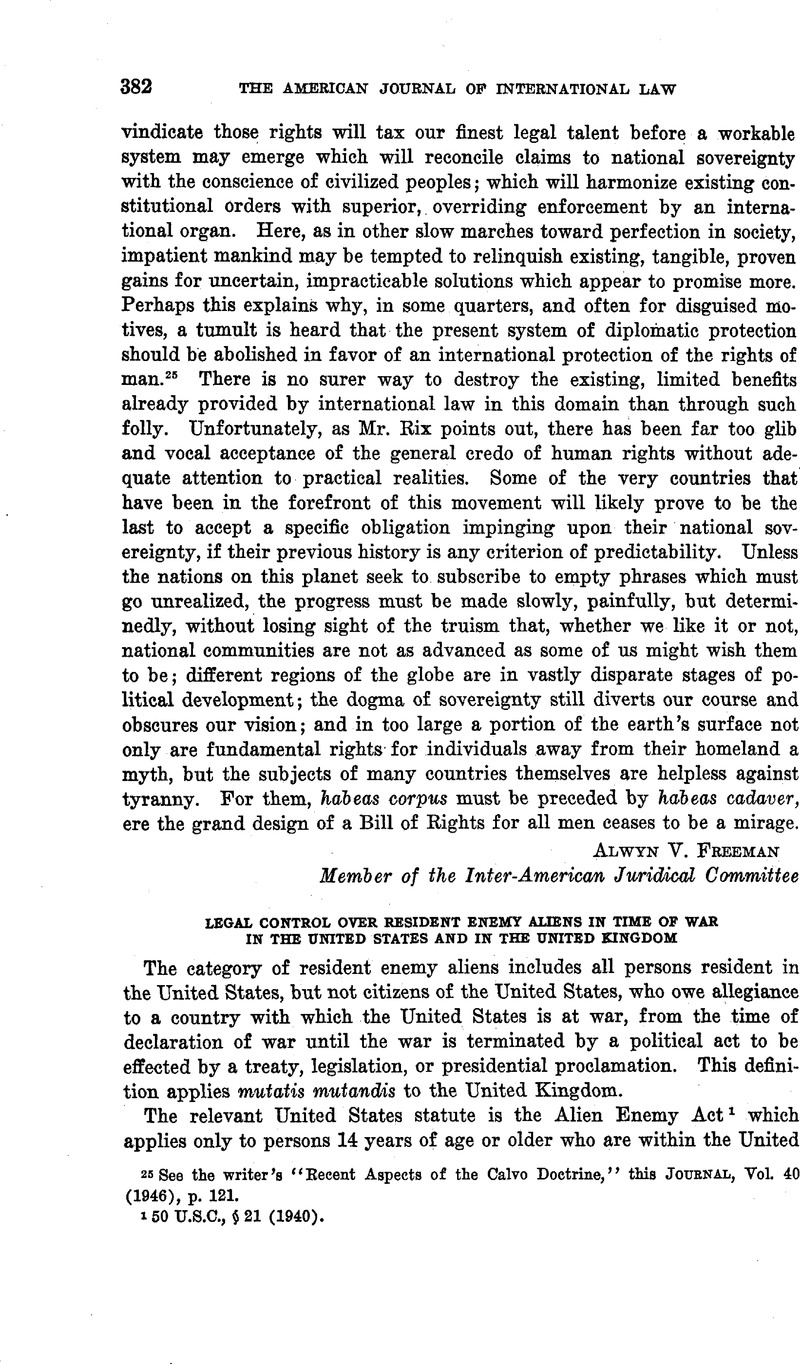No CrossRef data available.
Published online by Cambridge University Press: 20 April 2017

1 50 U.S.C., $ 21 (1940).
2 U. S. ex rel. D'Esqviva v. Uhl, 137 F. (2d) 903 (1943).
3 The legal consequences of the Trading with the Enemy Acts must be shortly distinguished. Under the Federal statute an “enemy” is defined by sec. (2) to mean any person of any nationality, resident within the territory of, or the territory occupied by, any nation with which the United States is at war. Under both this statute and the corresponding United Kingdom Trading with the Enemy Act, 1939 (and as amended), the test of “enemy character” is determined by residence and not by nationality. Thus in Eeising v. Dampfschiffahrts-Gesellschaft Hansa, 15 F. (2d) 259, German citizens resident in the United States during World War I I were held not to be “enemies of the United States” within the meaning of the Trading with the Enemy Act. A paradoxical and unfortunate aspect of this statute may be seen in the recent case of Okihara v. Clark, 71 F. Supp. 319 (1947); thia JOURNAL, Vol. 42 (1948), p. 224. A girl resident in Hawaii who was both an American citizen and a Japanese national sought to recover property in the hands of the Alien Property Custodian. The Court held that although “for most purposes while in the United Statep a dual citizen will be regarded as a United States citizen only,” the plaintiff to recover under the Act had to allege and prove that she was not a “national of a foreign country.” As she failed in this, the Custodian retained the property.
4 137F. (2d) 898 (1943).
5 Halleck, , International Law (4th ed.), Vol. II, p. 506 Google Scholar, et seq.
6 159 F. (2d) 50 (1947); this JOURNAL, Vol. 42 (1948), p. 213.
7 [1945] 1 K.B. 7.
8 Liversidge v. Anderson, [1942] A.C. 206.
9 Schaffenius v. Goldberg, [1916] 1 K.B. 284.
10 [1946] 1 All Eng.R. 628.
11 [1946] 2 All Eng.E. 434.
12 Jansen v. Driefontein Consolidated Mines, [1902] 2 A.C. at 500; and cf. Ludecke v. Watkins, 335 U.S. 160 at 170 (1948); this JOURNAL, Vol. 42 (1948), p. 937.
13 But see the vigorous dissent of Douglas, J., with Murphy and Eutledge, J.J., concurring, from this proposition in Ludecke v. Watkins, 335 U.S. at 184.
14 252 Fed. 600 (1918).
15 Cf. Wong-Wing v. U. S., 163 U.S. 228 (1896), for a discussion of the application of the “due process” clause of the 14th Amendment to aliens in time of peace.
16 Citizens Protective League v. Clark, 155 T. (2d) 290 (1946); and the Supreme Court in Ludecke v. Watkins, 335 U.S. at 171, said: “The Act is almost as old as the Constitution, and it would savor of doctrinaire audacity now to find the statute offensiveto some emanation of the Bill of Rights.”
17 335 U.S. 160 (1948).
18 It was stated in Stewart v. Kahn, 11 Wall. 493 at 507 (1870), that the war power “carries with it inherently the power to guard against the immediate renewal of the conflict and to remedy the evils which have arisen from its rise and progress.” And the Supreme Court in Woods v. Miller, 333 U.S. 138 at 141 (1948), upholding the continuation of rent control in the Housing and Eent Act of 1947, said that: “whatever may be the consequences when war is officially terminated, the war power does not necessarily end with the cessation of hostilities.”